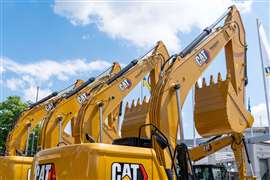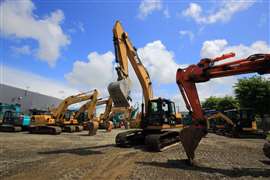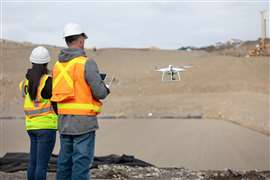INTERVIEW: Michael Kneeland, CEO, United Rentals, talks to IRN Editor Murray Pollok.
22 May 2009

In the current business environment, though, Mr Kneeland is more focused on ensuring United's smooth path through recession than on marching into a new continent, although that may happen in time. This trip was about introducing himself to some of Europe's movers and shakers - Kevin Appleton, Pierre Boels and Steve Corcoran among them - meeting investors in London, and addressing an audience of over 200 rental managers at the IPAF Summit in Dublin.
In his speech, and during his interview with IRN in the Irish capital, it was United's response to the economic downturn that was high on the agenda, and his message, although couched in positive terms, wouldn't have made comfortable listening, focusing on the need for rental companies to prepare for a difficult period.
That period, he says, has still to reach bottom in the US. "What we saw in the fourth quarter, is still panning out", says Mr Kneeland, "We still continue to see pressure, we still see rate pressure, and we are continuing to de-fleet."
There is little visibility about when the recession will end; "The US construction sector will be down somewhere like 20%, and it will bottom out probably in 09. I think we'll stay down at the bottom - the question is how long. I would say the back half of 2010 will see more of a gradual improvement. I don't think it will be like the [rapid] drop-off we saw. I think we will stay in the bottom and then will start to slowly come out of it."
He says it is too early to say if the economic stimulus package will have a major impact; "It's $135 billion, and much of it is dedicated to infrastructure - sewer works, road works. I think that bodes well for earthmoving equipment, but even before that you're going to see it benefit our trench business, because they are in the infrastructure side." He says his own view is that the package "wasn't as much as we all hoped for".
For United Rentals, the downturn and led it to look hard at its own business - "It focuses people to think outside the box. That's a healthy process to go through." - and Mr Kneeland says it has led to some significant changes. One is a refocusing on its core, which is rental. The contractor supply business, for example, has already gone. "We are a rental company", he says, "and we are going to be a rental company. That is our core competency."
A survey of its customers last year has led to a new sales structure that emphasises customer relationships, including a simplified staff compensation scheme across all lines of business and a greater focus on increasing revenues from existing customers, including major accounts. "It's more about how we value customer relationships - more customer-focused than just financial incentives", he says.
Of course many of the changes relate to downsizing. Seventy-five locations have closed and although more closures will be required, Mr Kneeland says the "heavy lifting is finished." Staff levels have already fallen from 12000 to 9600.
Mr Kneeland says the closures have mainly been where depots overlapped; "We haven't left any market: we are still in every province and every state. We had significant overlap is specific markets."
The cost cutting continues. "We are entering this economy with our eyes wide open", says Mr Kneeland, "We've taken compensation down, we've made closures, we've taken SG&A [Selling, General and Administrative expenditures] down by $84 million and will still get another $40 million down."
A rebalancing of the fleet is underway, with aerials one area under particular review, with small scissors the most affected by the downturn in construction of retail stories; "The retail business and big box construction is down significantly", says Mr Kneeland, "and I don't see it coming back any time soon."
On the other hand, he says the company is doing more on larger self-propelled booms, "as it relates to the industrial side of the business. So we are actively increasing in that area."
Mr Kneeland can't give details of the extent of the de-fleeting this year, but it will be significant. Three quarters of United's used equipment sales in 2008 were arranged by its inside sales staff, this year will see the company use external auctions to sell excess fleet; "We will do more auctions, and as a result we will see our margins come down substantially. They will not be massive in nature - there will be a lot of them and they will be geographically throughout North America." At the same time, United is refurbishing some of its older booms, through the manufacturers.
Capital expenditure will be down a lot, of course. Mr Kneeland says net fleet capital spending will be around $100 million in 2009 compared to $300-350 million last year.
Mr Kneeland was keen to tell the Dublin audience that opportunities exist, even in times of recession, with the industrial market being a "unique opportunity". He says that industrial business represents around 17% of United's revenues, which compares to the much higher 50% figure quoted by its main US competitor, RSC.
"I don't know how RSC measures theirs, [but] we think it's a significant opportunity for both of us. There is ample room", he says. Mr Kneeland thinks it could be a $12 billion market; "If we have $400-500 million, RSC may have somewhere in that area [because United's total revenues are around double those of RSC]."
United has now formed a dedicated industrial sales group led by ex-Hertz, Home Depot and JLG executive Joe Dixon. "We have a very successful team and they are starting to make some inroads", says Mr Kneeland, citing new contracts with Mittal Steel and Canadian National Resources Ltd, which operates mainly in the tar sands area.
Futher down the line and acquisitions are likely to come on the agenda as some companies suffer in the downturn. Mr Kneeland won't say much about this except that financially, the company will be prepared; "Success for us is generating significant cash flow, which we will. We generated $335 million last year, and we'll generate $300 million this year. We will more than likely pay down debt, but also have some ‘blue sky' so that if we wanted to do something, we would be able to."
And it will be North America that is first on the agenda when opportunities do arise; "I think long term it would be nice to be over in Europe. [But] we've got an economic environment ahead of us that we have to get through. We have enough on our plate right now.
"The biggest market for us is still North America. We have 8% market share. With have a significant upside without taking a lot of risk before we think about Europe", says Mr Kneeland, who adds that it would be realistic to think of a North American market share in the high teens.
For Mr Kneeland, becoming CEO in August last year (after almost a year as interim CEO) was the culmination of a 30 year career in rental (see box), and he describes his position as "exciting and humbling", although his timing could hardly have been worse.
"It's challenging to take the reigns in a very difficult market", he says, "But by the same token, we have a vision, and the vision is not just for the downturn, it's beyond."
BOX STORY
A rental career
It is perhaps rather rare for the chief executive officer of a major rental company to be a career rental person, but that's what Michael Kneeland is. He started in 1979 with Freestate Industries, one of the largest JLG dealers in the US, becoming a co-owner in 1986 and president from 1994. In 1996 it was acquired by John Cave's Equipment Supply, then the world's biggest aerial platform rental company.
Mr Kneeland joined United when it acquired Equipment Supply, becoming a district manager with responsibility for integrating acquisitions, of which United made a staggering 250 between 1997 and 2003. As a vice president he presided over the explosive growth of United's aerials division east of the Mississippi, before being appointed executive vice president in 2003 and interim CEO in 2007.
It is a track record on operations that is serving him well now; "One thing I've learned about hard times - as a leader you've got to stand up and be seen and be heard by your people", he says, "I come from the business, so I can talk to them specifically."






